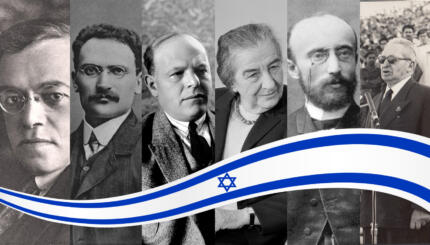This Olmert biography is copyrighted by and excerpted with permission of the Zionism and Israel Information Center.This biography was written in the beginning of 2006 prior to Olmert’s appointment as Prime Minister in 2006 and his stepping down as Kadima party leader in late 2008.
Ehud Olmert (or Ohlmert, Uhlmert) was born in Binyamina in 1945. His parents belonged to the right-wing Herut party and he was a member of the Betar youth movement.
Olmert served in the IDF as a combat infantry unit (Golani) officer. He was also a military correspondent for the IDF journal Bamahane. He holds B.A. and LL.B. degrees in Psychology and Law from the  Hebrew University of Jerusalem.
Hebrew University of Jerusalem.
Olmert became a member of the for the Gahal party in 1973 at the age of 28, emphasizing social justice. He served on the House, Constitution, Law & Justice Committee, State Control, Foreign Affairs and Defense, Finance, Education & Culture, and Internal Affairs and Environment Committees. In the Shamir government, from 1988-1990 he served as Minister Without Portfolio responsible for minority affairs, and from 1990 until 1992 as Minister of Health.

Help us keep Jewish knowledge accessible to millions of people around the world.
Your donation to My Jewish Learning fuels endless journeys of Jewish discovery. With your help, My Jewish Learning can continue to provide nonstop opportunities for learning, connection and growth.
Olmert’s political career was marked by quiet innovation and independent opinions. In November 1993, Olmert was elected Mayor of Jerusalem, ousting the popular but aging Teddy Kolleck on a platform of a unified Jerusalem. As mayor, he did not succeed in halting the progressive impoverishment of Jerusalem, nor did he succeed in equalizing the level of services and development provided to Arabs in East Jerusalem with those provided to Jewish sections of the city. He broke with right-wing members of his Likud party by advocating Palestinian self-rule. In 1999, his insistence that he believed opposition party leader Ehud Barak would not divide Jerusalem was a material help in Barak’s election campaign.
In the 1970s Olmert was involved in a complex libel suit. Critics say he tried to get the Likud to pay for his defense, even though his lawyers were from his own firm. The Israel police also investigated his involvement with irregularities in campaign financing in the 2003 campaign.
In February 2003, Ehud Olmert was appointed Minister of Industry and Trade and Deputy Prime Minister. Olmert became an influential member of the Cabinet. In November 2003, he gave a speech foreshadowing the disengagement plan of Ariel Sharon. Soon after, he gave his views in an interview:
“We are approaching the point where more and more Palestinians will say: we have been won over. We agree with [National Union leader Avigdor] Liberman. There is no room for two states between the Jordan and the sea. All that we want is the right to vote. The day they do that, is the day we lose everything. Even when they carry out terror, it is very difficult for us to persuade the world of the justice of our cause. We see this on a daily basis. All the more so when there is only one demand: an equal right to vote. The thought that the struggle against us will be headed by liberal Jewish organizations who shouldered the burden of the struggle against apartheid in South Africa scares me.”
“Had I believed that there is a real chance of reaching an agreement, I would have recommended making an effort. But that is not the case. The choice we will be facing will be between less than a Geneva Accord–which means a return to the 1967 border, the crushing of Jerusalem, and a struggle to our last breath to ward off the international pressure to absorb hundreds of thousands of refugees into the shrinking State of Israel–and a comprehensive unilateral move, and I stress the word comprehensive. Through such a move we will define our borders, which under no circumstances will be identical to the Green Line and will include Jeru salem as a united city under our sovereignty.”
salem as a united city under our sovereignty.”
Disengagement, modified to a much smaller scope, became announced Israeligovernment policy a few weeks later. Olmert worked closely with PM Ariel Sharon to advance the idea in the Likud party in the face of stubborn opposition.
In the summer of 2005, when Benjamin Netanyahu resigned in protest over disengagement, Olmert became finance minister.
In November 2005, Sharon decided to leave the Likud party and found the Kadima Party.Olmert joined with Sharon. Skeptics insisted that Kadima was a “Sharon party,” dependent on the leadership of Sharon. But on January 4, 2006, Sharon suffered a massive stroke and was hospitalized under anesthesia. Olmert assumed the powers of acting prime minister, holding a cabinet meeting on January 5 to signal the transfer of power.
In the 2006 elections, Olmert became Prime Minister as leader of the Kadima Party. Soon thereafter, the Second Lebanon War broke out. The Winograd Commission investigating the government’s handling of the war accused Olmert of “serious failure in exercising judgement, responsibility and prudence.” In addition, corruption charges continued to haunt him from earlier in his career. As a result, in July 2008 Olmert announced that he would step down as party leader of Kadima, and early elections were called for March 2009.
In August 2009, Olmert became the first former prime minister of Israel to be indicted when he was indicted for three corruption charges.


